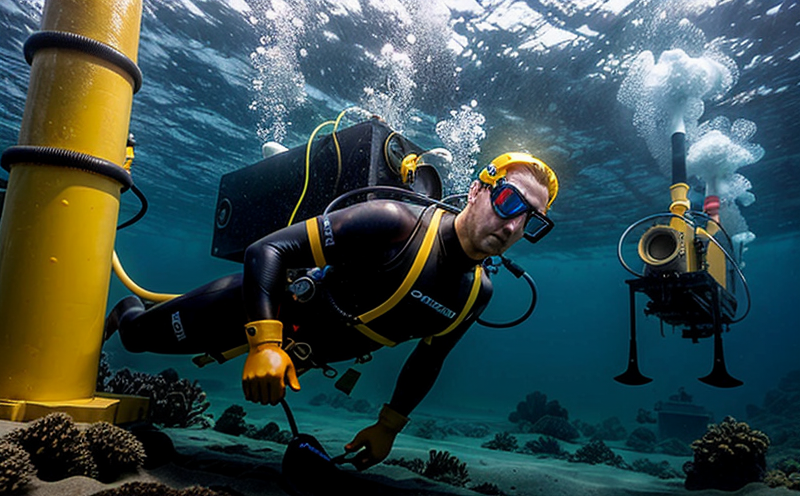ISO 13628-6 Subsea Production Control Systems Testing
The ISO 13628-6 standard is a critical tool for ensuring the reliability and safety of subsea production control systems (SPCS) in offshore oil and gas operations. These systems are responsible for managing the flow of hydrocarbons from subsurface reservoirs to production facilities on the surface, and any failure can lead to significant operational disruptions and environmental hazards.
The testing protocol outlined in ISO 13628-6 is designed to evaluate the performance of SPCS under a variety of conditions that mimic real-world scenarios. This includes pressure, temperature, flow rate variations, and electrical load changes. The goal is to ensure that these systems operate reliably over their entire service life, which can span decades in some cases.
The testing process begins with detailed preparation of the specimen. This involves installing the SPCS in a controlled environment where it can be subjected to the prescribed test parameters. The instrumentation used for this purpose includes pressure transducers, temperature sensors, flow meters, and data loggers. These devices provide real-time monitoring of critical variables during the tests.
One of the key aspects of ISO 13628-6 is its focus on simulating the dynamic operating conditions that SPCS encounter in subsea environments. This includes testing for endurance under cyclic loading, resistance to corrosion, and stability under extreme pressure differentials. The standard also addresses the issue of electrical insulation integrity, which is crucial for preventing short circuits and other failures.
Another important aspect of this test protocol is the evaluation of the system's ability to recover from simulated faults. This includes testing for self-diagnostic capabilities and the effectiveness of any fail-safe mechanisms. The results of these tests are used to determine whether the SPCS meets the acceptance criteria specified in ISO 13628-6.
The testing process is not just about ensuring that the system works under ideal conditions; it also involves evaluating its performance under adverse conditions. This includes testing for resilience against mechanical stress, thermal shock, and electrical interference. The results of these tests are used to determine whether the SPCS can withstand the harsh environments in which they operate.
The final step in the test process is the generation of a comprehensive report that details the results of all the tests performed. This report serves as a valuable tool for quality managers, compliance officers, and R&D engineers by providing detailed information on the performance of the SPCS under various conditions. It also helps procurement teams make informed decisions about which suppliers to work with.
Compliance with ISO 13628-6 is essential for operators seeking to ensure that their subsea production control systems meet the highest standards of reliability and safety. This not only enhances operational efficiency but also reduces the risk of accidents and environmental damage.
Benefits
Compliance with ISO 13628-6 offers numerous benefits to operators, manufacturers, and regulators alike. Firstly, it ensures that SPCS are robust enough to withstand the extreme conditions found in subsea environments. This reduces the likelihood of failures and extends the operational life of these critical systems.
Secondly, compliance with this standard enhances safety by ensuring that SPCS can recover from faults without compromising safety protocols. This is crucial for preventing accidents and minimizing environmental impact.
Thirdly, compliance helps operators meet regulatory requirements and gain market access to international markets. Many countries have adopted ISO standards as a benchmark for quality and safety in their regulations.
Furthermore, adherence to this standard aids manufacturers in improving product design and reliability. By following the test protocols outlined in ISO 13628-6, manufacturers can identify and address potential weaknesses in their designs before they reach the market.
Industry Applications
- Offshore oil and gas operations
- Deepwater drilling and production facilities
- Subsea pipeline monitoring systems
- Production platform control systems
The ISO 13628-6 standard is widely used in the offshore oil and gas industry, where SPCS play a crucial role in managing hydrocarbon flows. These systems are tested to ensure they can operate reliably under extreme conditions, including high pressures and temperatures.
In deepwater drilling operations, SPCS must be able to handle the immense pressure differentials that occur at great depths. The tests conducted according to ISO 13628-6 simulate these conditions to verify the system's durability and reliability.
Subsea pipeline monitoring systems are also subject to rigorous testing under ISO 13628-6. These systems need to be able to detect any anomalies in the flow of hydrocarbons, which could indicate a potential leak or other issue. The tests ensure that these systems can accurately monitor and report such issues.
Production platform control systems are tested for their ability to manage the flow of oil, gas, and water from subsea reservoirs to production facilities on the surface. These systems must be able to respond quickly to changes in operating conditions, which is why ISO 13628-6 testing is essential.
Environmental and Sustainability Contributions
- Reduces operational downtime due to system failures
- Minimizes the risk of environmental damage from accidents
- Promotes the use of sustainable technologies in the oil and gas industry
The ISO 13628-6 standard contributes significantly to sustainability by promoting the use of reliable and safe subsea production control systems. By ensuring that these systems operate without failure, the standard helps reduce operational downtime, which in turn minimizes the environmental impact of offshore operations.
Additionally, the testing protocol helps minimize the risk of accidents that could lead to environmental damage. This is particularly important given the sensitive nature of marine ecosystems and the potential for significant harm from oil spills or gas leaks.
The use of reliable SPCS also promotes the adoption of sustainable technologies in the oil and gas industry. By ensuring that these systems are robust enough to operate reliably over long periods, operators can reduce their reliance on maintenance and replacement, which helps conserve resources and minimize waste.





